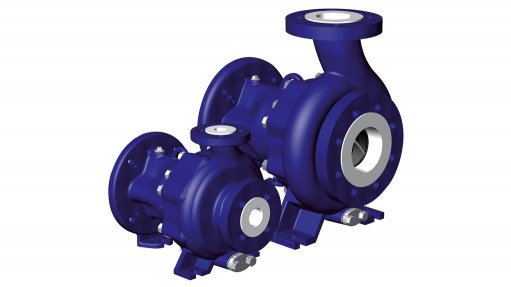
VERDERMAG The cast iron pump casing is bonded with ethylene tetrafluoroethylene lining that has a minimum thickness of 3 mm
Pumps supplier Verder South Africa notes that its range of centrifugal mag drive pumps, VERDERMAG, operates “exceptionally well” when conveying abrasive and corrosive substances, making it ideal for the chemicals and petrochemicals industries.
“One of the many applicationsVerder specialises in is the transfer of hazardous chemicals,” says Verder marketing manager Elaine van der Westhuizen.
She notes that one of the company’s recent projects was for chemicals company Omnia Group’s agriculture division Omnia Nutriology, which approached Verder in November regarding the conveying of liquid fertiliser. “Based on the process requirements, we suggested the VERDERMAG centrifugal pump, as it can easily transfer the required aggressive chemicals product without any leakages.”
Other advantages include the pump casing, bonded with ethylene tetrafluoroethylene or perfluoroalkoxy linings, with a minimum thickness of 3 mm. Further, it is a nonstainless steel pump, making it more cost effective, as it uses a cast iron casing. Additionally, certain stainless steel alloy pumps are unableto convey the full range of acidic substances, unlike the VERDERMAG, Van der Westhuizen comments.
The pump uses a thrust balance design, which creates three distinct pressure regions around the impeller. These regions are the suction pressure in the impeller eye, the discharge pressure in the volute and the balance pressure behind the impeller.
In operation, the balance pressure is about one-quarter to one-third of the discharge pressure, which is created by the routine pumping action of the impeller, while the balance pressure is controlled by the combined action of a fixed and a variable orifice. The fixed orifice is created by a set of clearance rings behind the impeller. These rings limit the leakage flow behind the impeller to a relatively constant rate. The leakage then flows around the magnets and past the bushing to the thrust control valve.
Van der Westhuizen notes that Verder is looking forward to servicing the chemicals and petrochemicals industry this year, as the company sees massive potential in this evolving market, consisting of many and varied potential and existing clients. Further, she notes that the company’s product and technical services offering ensures that clients receive several benefits, including reduced maintenance, reduced consumption and total cost of ownership savings.
Further, the company is excited to grow into the pharmaceuticals and food and beverage industries, as well as the preservative side of the chemicals industry; they are linked in many ways, she notes.
She says that the company, which has been actively involved in the chemicals and petrochemicals industry for decades, has managed to build a formidable reputation with its customers in this market.
Verder’s peristaltic and air-operated double- diaphragm pumps are frequently used at water purification and treatment plants, where chemical dosing is required. “We also have many clients that require fertiliser applications in process plants.”
To further its strategic goals, the company last year acquired distribution rights for the Packo pumps range used in the food and beverage industry. The process pumps are used in the most demanding hygienic applications, including filtration, pasteurisation, yeast propagation and clean-in-place cleaning systems.
Van der Westhuizen concludes that Verder’s commitment to clients is paramount, noting: “It is our motto that, rather than simply just selling a pump, we provide a solution and enhance a client’s production process.”